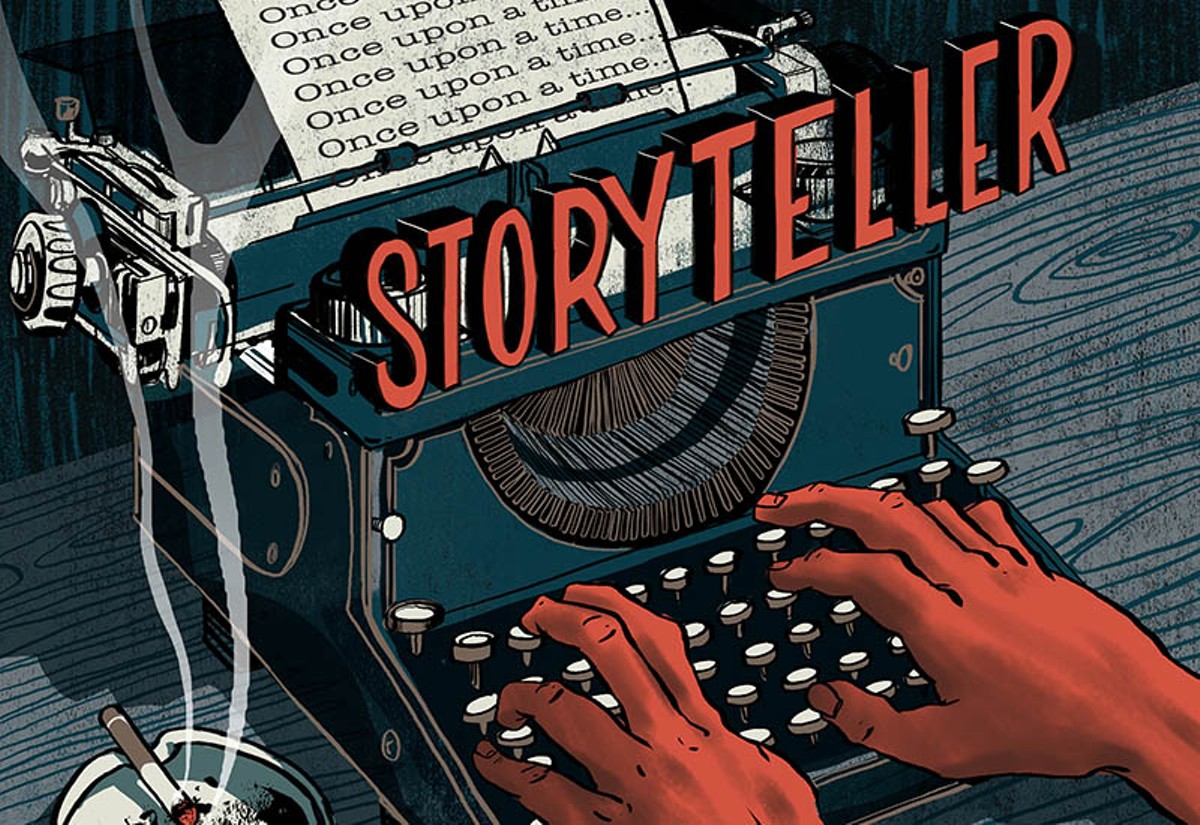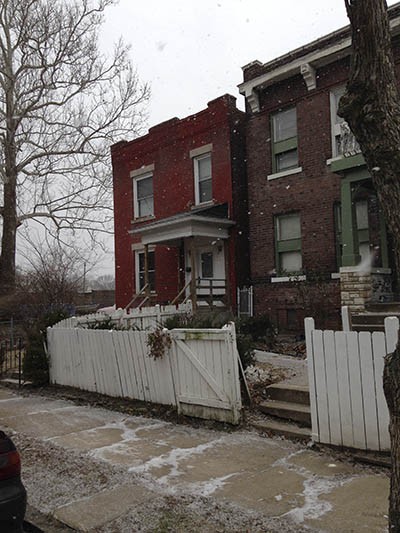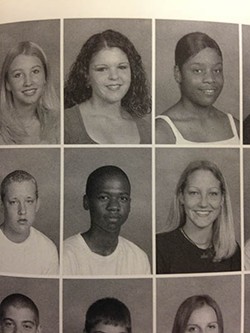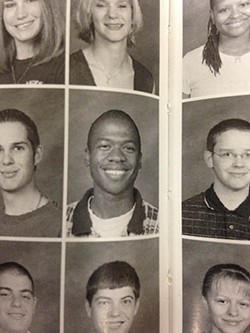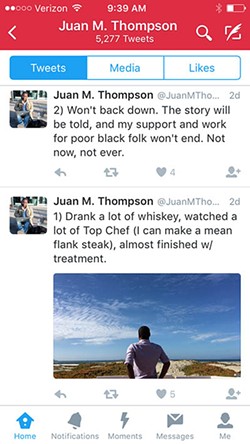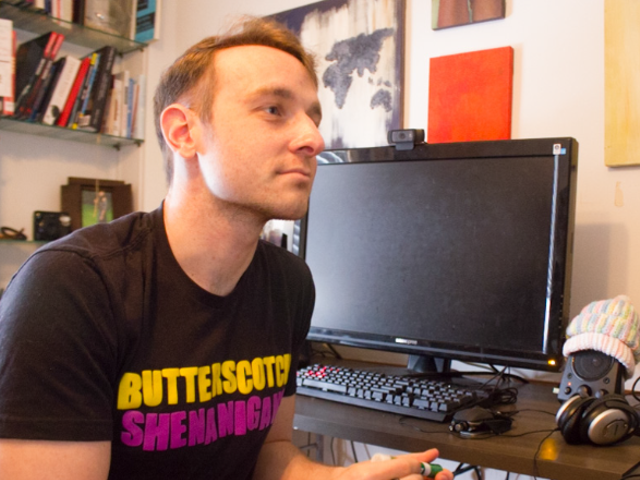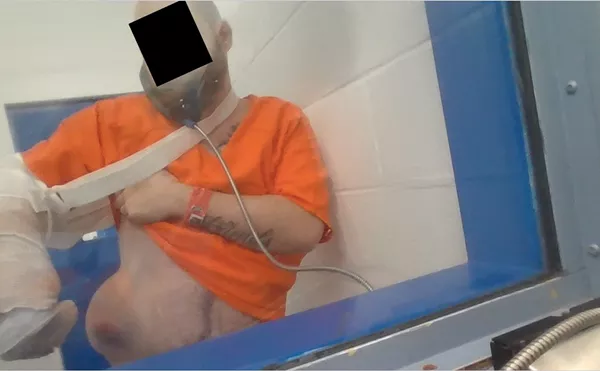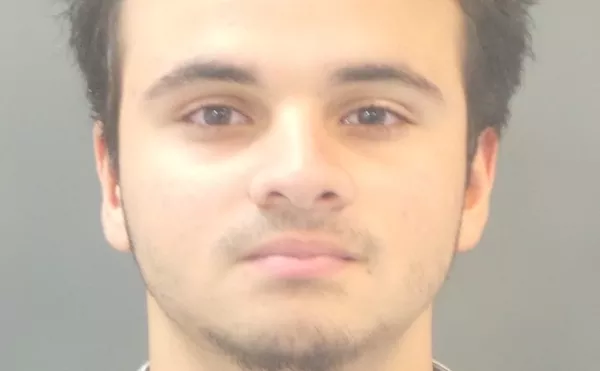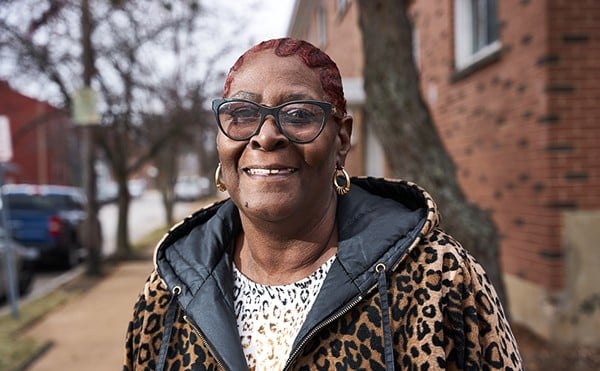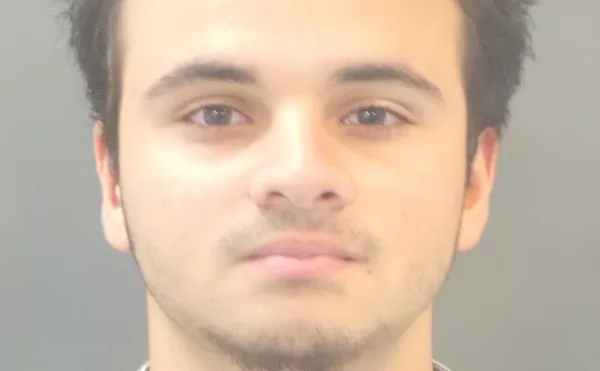In late June, a gunman slipped into a beloved black church in Charleston, South Carolina, and massacred nine people who had met for Bible study.
The slaughter of innocents in a house of worship garnered news coverage across the country, and reporters from the nation's most powerful media organizations began working through a familiar checklist: How many were dead and how many had been injured? Who was the killer? And, perhaps most importantly of all, what was his back story? People always want to know why.
Dylann Roof, a scrawny white guy with a bad haircut, quickly emerged as the prime suspect, but that only led to more questions. Roof was apparently a racist, but plenty of those don't open fire in a church. What had triggered his murderous rampage?
Then a young journalist with St. Louis roots landed a big scoop.
Juan Thompson, a 30-year-old rookie reporter for online news site the Intercept, claimed he'd landed an exclusive interview with Roof's cousin Scott and that he could trace the fury that fueled the carnage.
"Scott Roof, who identified himself as Dylann Roof's cousin, told me over the telephone that 'Dylann was normal until he started listening to that 'white power music stuff,'" Thompson wrote in a story that went live at 11:05 p.m. on June 18. "He also claimed that 'he kind of went over the edge when a girl he liked started dating a black guy two years back.'"
ABC News had previously spoken to Dylann Roof's roommate, who'd claimed the shooter had talked about plans for racial violence, but the narrative of a jilted lover seeking revenge was a juicy new wrinkle.
"Dylann liked her," Scott Roof said, according to Thompson. "The black guy got her. He changed. I don't know if we would be here if not..."
In Thompson's telling, the interview ended with a dramatic flourish as the cousin broke off in mid-sentence and hung up the phone.
News agencies across the country were soon citing the Intercept's exclusive as they raced to cobble together a picture of the gunman.
There was only one problem. It was a lie. Scott Roof doesn't exist, two relatives later told the Intercept. And a story-by-story review of the young writer's work ultimately convinced the site's leadership that the cousin had been only one of Thompson's inventions.
The article was part of a "pattern of deception" that spread across a number of his posts, Betsy Reed, the site's editor in chief, charged in a damning February 2 editor's note.
"Thompson fabricated several quotes in his stories and created fake email accounts that he used to impersonate people, one of which was a Gmail account in my name," Reed wrote.
The bombshell accusations left anyone who'd ever worked with Thompson wondering if he'd scammed them too. It's a tricky question to untangle, noted Josh Marshall, the editor and publisher of the liberal online publication Talking Points Memo, which had published one of his essays.
"One of the dirty little secrets of fact-checking," Marshall wrote in an editor's note, "is that it is quite difficult to uncover a determined effort to deceive."
Even more than plagiarism, fabrication is the ultimate sin of journalism. Taking credit for someone else's work will probably get you fired. But selling fiction as fact invites pariah status.
Famous fabricators Stephen Glass of the New Republic and Jayson Blair of the New York Times were rising stars before they were ejected from the news business for inventing their material. Now Glass, who graduated magna cum laude from Georgetown University's law school, can't even get licensed as a lawyer because of his history as a dishonest journalist. Blair works as a life coach in Virginia.
But even as those two writers became nationally infamous for their sins of fabrication, Thompson's errors would arguably have a wider impact. That's less about the publication he worked for and more about the nature of journalism in the digital age. These days, everyone is rapidly repurposing stories from somewhere else, slapping on web-friendly headlines and trying to turn them into pageviews.
As Washington Post media critic Erik Wemple noted, Thompson's Scott Roof "scoop" was cited by the New York Daily News, New York Post, New York Magazine, Toronto Sun, Alternet, the Root, Radar Online, Latin Post, Centric TV and even the U.K.'s Indy, Daily Mail and Mirror — and that's likely an incomplete list.
The alleged hoax prompted chagrined editors from the fooled outlets to write their own correction notes or, in some cases, to simply erase the stories from their digital archives as if the whole messy business never happened.
"In addition to the obvious lessons about editing, the Thompson story yields some notions about the psychology of aggregation," Wemple wrote. "Read the editor's notes above from organizations that followed up the Intercept's work: They don't apologize for having failed to vet the story and instead just drop the blame on the Intercept."
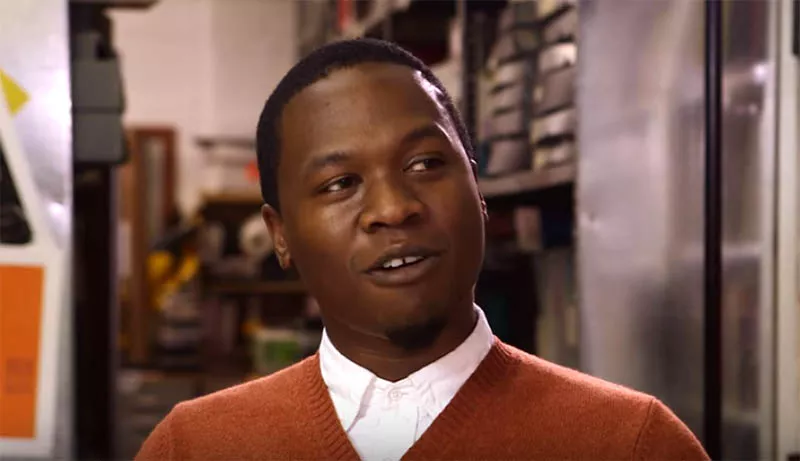
The Intercept launched in February 2014, announcing a short-term mission to report on government spying using information leaked from the site's primary source, National Security Agency contractor Edward Snowden. In the long term, the founders hoped to build a digital magazine for "aggressive and independent adversarial journalism across a wide range of issues, from secrecy, criminal and civil justice abuses and civil liberties violations to media conduct, societal inequality and all forms of financial and political corruption," according to a news release at the time.
Implicit in the long-term mission was the idea that the Intercept would be different from traditional media sources dominated by white men, but the new venture was soon criticized from the left for falling into the same hiring pattern.
"A Very Serious Problem With Very Serious Journalism," read a headline on the Nation's website. "Can the Intercept make a dent in the overwhelming white maleness of policy reporting?"
Co-founder Glenn Greenwald, the lawyer-journalist who grew famous as a Snowden confidante, told the author that the lack of diversity in the Intercept's early going was "by far the most disappointing thing about our launch." He promised to do better as the site staffed up.
Thompson, who is black, was hired eight months later, in November 2014. By then the news agency had grown from a small handful of employees to "just north of twenty reporters, editors and technologists," the company said in a statement. Within ten months of that, the editorial staff was at thirty-five, with five of the sixteen writers people of color, according to numbers provided by the Intercept.
Thompson started writing for the site just three months after Michael Brown was shot to death by Ferguson police Officer Darren Wilson. His hire gave the Intercept a sharp-tongued writer with an intimate knowledge of the troubled city and its problems at a time when out-of-town reporters from other national outlets were seen as an occupying army, parachuting in to exploit the stories of vulnerable people. Handsome, with the rare ability to speak as well as he wrote, Thompson was soon filing stories from the heart of the unrest.
His December 2014 piece, "'No Justice, No Respect': Why the Ferguson Riots Were Justified," described the night protesters learned Wilson wouldn't be criminally charged for killing Brown.
After being tear gassed, "my eyes burned and my lips felt as if my Chapstick had been contaminated with Wasabi paste," Thompson wrote. "As people scattered, someone in the crowd fired a gun into the air. Upon hearing the shots I instinctively hit the ground and cowered behind a car. Being raised in west St. Louis, I was taught to always kiss the floor when I hear the 'pop, pop, pop' of a gun."
The vividly written story, which included an account of Thompson allegedly confronting St. Louis Mayor Francis Slay during a chance encounter in a coffee shop, was Thompson's fifth piece on Ferguson in less than two weeks. In the following months he would go on to file searing dispatches about injustices in Baltimore, Mississippi and Chicago. He relished the opportunity to strike back at what he calls an "oppressive, anti-black, racial supremacist, capitalist system" that kneecaps all but the country's rich and white in the pursuit of basic civil rights and opportunities.
Thompson described his reporting style in a 2015 interview with Chicago Public Radio's WBEZ as "a la Vito Corleone in The Godfather."
He added, "Of course, I don't use violence. I use my keyboard."
Thompson's father was a terror until the day he died, according to a piece Thompson wrote for Talking Points Memo in July 2015.
His dad, whom he identifies only by his first name in the essay, had "an uncanny physical and personality resemblance to Wesley Snipes' New Jack City character," Thompson wrote. He was also a ruthless St. Louis drug dealer and murderer, according to the story. An introspective son's exploration of an uncomfortable legacy, the essay details violence and crime committed not only by Thompson's father, but also by at least three uncles.
"All the murderers in my family have been men," Thompson wrote. "Poor men, desperate men, molded in an urban enclave of poverty on St. Louis' destitute west side."
In the wake of the Intercept's editor's note, Talking Points Memo removed the story from its website. In its place is a note from Marshall, which explains that even though the site's fact checkers had been able to verify much of what Thompson wrote, other sections required you to trust him as a narrator.
"However, particularly in a personal essay, the integrity of the piece rests inevitably on the good faith of the writer — a fundamental trust that he or she is being straight with us as editors and you as readers," Marshall wrote.
The Intercept hasn't taken down Thompson's stories. But the site has corrected four of them, retracted the one about Scott Roof and attached notes to at least fifteen others, warning readers about quotations its researchers couldn't confirm.
Thompson's last story for the Intercept was in December. He was fired in January, according to the news agency. It's unclear what led to the initial investigation, and Reed declined to discuss the matter.
"Thompson was dismissed because of serious ethical violations, several of which he admitted to," a spokesperson for the company said in a statement.
The editors' notes and retraction left some St. Louisans wondering whether Thompson even grew up here. Wasn't it awfully convenient, in the fall of 2014, to be a young black reporter from St. Louis, even as St. Louis found itself at the center of a national conversation about race? Wasn't his background a bit too outlandish?
Thompson isn't exactly chatty when contacted in early February, just hours after the Intercept went public with its retraction. Questioned specifically about the Talking Points Memo essay and the full name of his father, his emailed answer is terse.
"Truly stand by the TPM piece. Donald Jones."
To reporters who contact him for reaction to Reed's allegations, including the RFT, Thompson forwards a letter he'd sent his former boss. And not just one letter — as a reporter for Gawker first noticed, he was sending different versions of the letter, adding new grievances as the day continued.
In the letters, he claims he is "feverishly struggling" with testicular cancer and can't get to his notes to answer the Intercept's questions — his files are in New York, and he is undergoing treatment in St. Louis.
Reviewing some of his notes, however, he writes that he's found "a habit of writing drafts of stories, placing the names of ppl I wanted to get quotes from in there, and then going to fetch the quotes." He adds, "If I couldn't obtain a quote from the person I wanted, I went somewhere else, and must've forgot to change the names — clearly."
If Reed had a problem with that, Thompson knows who she could blame.
"Was it sloppy? Yes?" he writes. "But I'm a cub reporter and expected a sustained and competent editor to guide me, something which I never had at your company and something with which the Intercept continues to struggle as everyone in this business knows."
He acknowledges that he also encouraged some sources to use fake names to protect themselves from the publicity, he says.
"Ultimately, the journalism that covers the experiences of poor black folk and the journalism others, such as you and First Look, are used to differs drastically," he writes. "This dilemma is the Great Problem with the white media organizations that dominate our media landscape."
Lots of people get the letter, but no one seems to be able to get Thompson on the phone as news of the scandal spreads. He responds in short emails with partial answers to the RFT in the hours and days that follow, eventually offering to put a reporter in touch with his brother and possibly his mother to verify his family history. But he never sets up a time and the emails stop before long.
A visit to his mother's house among the vacant buildings of Wabada Avenue yields little more.
His mom listens quizzically for a moment until she's asked about the allegations against her son.
"Oh, I have no comment," Yolanda Thompson says, ushering a reporter toward the door. "I'm sorry, but I have no comment. I wish I could help you."
Less than 15 minutes later, Thompson sends a text message.
"Juan Thompson here," he writes. "I'll call you in a bit."
Thompson's voice is rich and clear on the phone, like a college professor giving a lecture. He will never back down, he says.
"I'm going through a tough time right now, but I've been through a lot tougher times than this," he says. "I'm from the west side of St. Louis, and we're fighters, and we come through, and I will come through on this. I won't be silenced or cowed by any billionaire's company or by any of these folk. That just won't happen."
He declines to speak about the Intercept's allegations, but says this of Reed's note: "That story is full of lies, mischaracterizations and distortions."
He adds, "These people have been dishonest. They have mischaracterized and distorted many, multiple things, because they know the truth about how an anti-black situation at the Intercept this was, and you can quote me on that. I will say that."
The oldest of his mother's ten kids, Thompson grew up among the poverty and violence south of Fairground Park and later in the similarly troubled Wells-Goodfellow neighborhood. He was bussed to Mehlville High School as a teen through a desegregation program that fed black students from north city into the suburban county school.
His mother later agrees to an interview with her son's blessing and says she split with Thompson's biological father over his drug dealing when their son was about five years old.
"He was a very kind-hearted man," Yolanda Thompson says. "But he sold drugs all his life."
Thompson's father, Donald Jones Sr., was officially considered a "persistent offender" by the state of Missouri, according to court records. His arrests were primarily for cocaine and heroin. In 2004, he was convicted of aggravated stalking and violating an order of protection after attacking a woman and making what prosecutors called "a credible threat to kill" her. He was sentenced to ten years in prison but was instead released on probation, according to court records. He was dead before the year was out. Yolanda Thompson says he died in a car crash while running from police a month from their son's high school graduation.
Thompson describes his father this way: "He was an inconsistent but persistent negative influence, and that's the best way of summing up who he is."
Jones might have been surprised to see the life his son crafted for himself. Thompson would have been one of about 250 desegregation students studying at Mehlville, says the high school's former principal, Vince Viviano.
The 2,000-student campus is among with most diverse in the region, with a sizable enrollment of Bosnian students along with others from St. Louis County.
Thompson appears less than a half-dozen times in four years of school yearbooks, including group photos of concert band and the senior year student council. Viviano can recall little about him.
"I remember his face," he says. "I remember him being a really congenial kid."
Mehlville was an A-plus school, meaning the state would pay for two years of junior college for students who achieved certain benchmarks for grades and attendance. Many of Thompson's classmates enrolled in Meramec Community College each year as a result. If they were leaving St. Louis, they headed west to the University of Missouri-Columbia.
Viviano sounds stunned when told Thompson eventually moved to the East Coast to attend Vassar College. He can't remember a single other kid in his nine years at Mehlville who did that.
On the surface, Thompson seemed to adapt to life at the small private college without much trouble. He began to write a little for the school paper and hosted a podcast called News and Booze, in which he and three political science classmates debated topics such as the New York Police Department's stop-and-frisk strategies and a white law school applicant's lawsuit attacking affirmative action.
Ian D'Emilia, now 25, was a co-host of the podcast and roomed with Thompson and two others during their senior year in 2013.
"He's a charismatic guy," D'Emilia says on the phone from San Francisco. "He's a funny guy. He's an intellectual guy."
He could also be secretive and combative. D'Emilia recalls a night they were hanging out at a friend's place talking politics. The conversation turned to the then-mayor of Newark, Cory Booker. Thompson, not a Booker fan, grew furious with the friend. "He took his shirt off, like they were going to fight," D'Emilia says.
Around professors and others he wanted to impress, Thompson was pure eloquence. D'Emilia says he had the charm and smarts of a politician in the making. Thompson especially liked to talk about his acceptance into University of Chicago Law School, one of the best in the nation.
But D'Emilia was growing increasingly skeptical of Thompson's stories. As graduation approached, they made plans to go to a string of commencement events together. Thompson, though, never showed up.
When he didn't even go to collect his diploma, D'Emilia tracked him down at their apartment to ask why. Thompson claimed he was short a language credit he needed to graduate. It seemed almost impossible he wouldn't have known that before graduation week, especially since Thompson had talked so much about Chicago and law school, D'Emilia says.
"He was a peculiar guy," he says today. "Very peculiar. I never really trusted him."
Thompson moved to Chicago after leaving Vassar and began trying to make his way as a journalist. He interned for few months in the summer of 2013 at hyperlocal news site DNAinfo Chicago, he says, writing neighborhood stories. He landed another internship almost a year later at WBEZ, the NPR affiliate in Chicago.
And then, after less than a year total of experience as an intern, he was hired by the Intercept and moved to Brooklyn.
The Intercept's story-by-story review of Thompson's work leaves some sections of his writing still standing. Often, it's the work pulled from other sources and cited.
Looking at the body of work and the parts that his former employer is no longer willing to stand behind, Thompson seems less a Stephen Glass — spinning fantastical tales that really were too good to be true — and more a Jayson Blair, a guy who took shortcuts or embroidered details that weren't in the foreground.
Even in his Scott Roof story, the supposed interview with the cousin was just an anecdote dropped into the fourth paragraph, below talk of the shooter's racist photos on Facebook and a quote and citation from an ABC story. The parts found to be fake by the site's review team were usually just the bits of original reporting needed to complete a narrative supported by context and facts already out in the world.
That's also the case in Thompson's story about some local unsolved murders, "St. Louis Grapples — And Fails to Grapple — with the Matter of Murdered Black Women." The story describes a common thread of apathy and disrespectful media coverage in response to the killings, buttressing Thompson's argument with readily available crime statistics. The part he allegedly fabricated is an interview with a criminal justice professor, the kind of secondary interview reporters include for a little context. The woman does exist, but she doesn't teach criminal justice and hadn't spoken to Thompson, the Intercept found.
The retracted and corrected stories on the site cover only the occasions where the Intercept could find people who refuted claims or denied saying the quotes attributed to them. The site's investigators noted more than a dozen other instances where they couldn't find the people quoted and couldn't determine if they were real or not.
It's a pattern that casts doubt not only on Thompson's stories, but pieces of his resume. In bios attached to freelance pieces, he was repeatedly described as a Vassar grad who was taking a break from law school as he gave journalism a try and worked on a forthcoming memoir — It Hurts Even More in French — to be released by Crown Publishing. But a University of Chicago spokesman wouldn't say if Thompson was ever accepted to the prestigious school, much less confirm whether he'd been awarded a full scholarship — a detail mentioned in a Vassar alumni magazine piece that quoted Thompson.
The memoir claim was repeated in the Intercept's announcement of Thompson's hire in November 2014. But months later, it was deleted from the site — without so much as an editor's note letting people know the item had been altered.
When asked about the change by RFT, Reed says the site's computer system shows Thompson did it himself.
"The Intercept did not find out the claim was suspect until we conducted our investigation much later," Reed, who didn't hire Thompson, writes in an email.
The claims about law school and the supposed book deal are like the people the Intercept's researchers couldn't find. Maybe he interviewed those people, and they're now hard to locate. Maybe the book deal fell through. Maybe he was accepted to law school and didn't go. But in Thompson's new reality, doubt covers anything that can't be pinned to verifiable facts.
Thompson insists it was all true enough. He continues to fight back, and seems most bothered when people question the stories he's told about his family and hometown. That includes the essay that Talking Points Memo deleted, which detailed the crime and violence committed by his father and uncles in the same neighborhoods where their families had to live.
Court records confirm his father was repeatedly arrested and incarcerated during Thompson's life. Harder, if not impossible to confirm, are the sections attributed to memory. Did Jones really tell his son he'd murdered four people? Did he say "I smoked some niggas," as Thompson writes?
"I wish I could make this shit up, but I can't because it would be such a horrible thing for a child and a person to have to go through the things I wrote about," Thompson tells RFT.
Another story, "How St. Louis Police Robbed My Family of $1,000 (And How I'm Trying to Get It Back)," is even more of a tangled web.
First published eight months after the unrest in Ferguson brought a national spotlight to the way petty traffic offenses have tormented black people in the St. Louis area, the story describes the time in 2007 when his mother was jailed in St. Louis city following a traffic stop.
Thompson wrote that his mother had been taken into custody by St. Ann cops, who mistook her for another woman with a bunch of outstanding warrants in the city.
"St. Ann is one of the more notorious cities in the county when it comes to traffic violations, and in my mother's case, the city's finest, quite simply, fucked up," he wrote. "As it was, my mother had no warrant; the police confused her with another woman who shared her name — sans the middle initial."
But that part simply wasn't true. His mother had warrants from 2001 and 2003 for driving on a license suspended in 1997, according to records at the 22nd Circuit Court examined by RFT.
Questioned about his story's claim of mistaken identity, Thompson says that wasn't the point.
"The point about the story was that she was arrested and detained for a few days, and her family didn't know where she was," he says. "Even if a poor black woman was driving on a suspended license, she can still be mistaken for someone else who has a worse record. She can also be detained for days without her family knowing where she was."
He offered his mother's plight as an example of the way the criminal justice system grinds up those who don't have political clout or money to pay for attorneys, and parts of the narrative check out. Yolanda Thompson did spend at least two days in city lockup. She did plead guilty, and it does sound like a misery that a person with a lawyer on retainer wouldn't have suffered.
"I cried for four or five days while I was down there," she tells RFT. "It was a horrible experience."
But the reporting was at least sloppy, if not intentionally misleading to sharpen the point. Yolanda Thompson admits she had a traffic warrant. She claims today that she was the victim of mistaken identity, but in her telling, it's not clear whether the mixup was at the jail after she was already booked, or in St. Ann.
A look at court records or maybe a few phone calls by Thompson would have cleared up some of the discrepancies in his piece — but also maybe complicated a juicy narrative. It's a far better story, after all, if Thompson's mom was the victim of mistaken identity, not just someone who suffered more than she should have after driving on a suspended license.
City prosecutors, city police and a spokesman for the mayor's office all said they don't have any records of Thompson or anyone from the Intercept ever contacting them to investigate.
Journalist Andrew Jerell Jones worked with Thompson for about six months at the Intercept. He says they were "friendly" and, like Thompson, he claims the site has a race problem, though he won't get into specifics.
That doesn't excuse bad journalism, he says.
"There are some fundamental problems at the Intercept with race, as there are in media in general, including liberal online media," Jones writes in an email. "But what Juan did was something that is TABOO for all of us journalists of ALL color and something that does not make him look like the martyr he is sadly trying to portray himself as.
"What he did was made it worse for all of us minority journalists, especially black, who have legitimate issues with race in newsrooms and media as a whole."
Thompson's conversation with the RFT lasts more than an hour on the phone, and both before and after it, he answers a few questions by email. But even then, the young writer is maddeningly elusive. As just one example, asked for proof of his cancer diagnosis and treatments, Thompson says he'll have to ask his attorney.
He had previously made no secret of the disease, tweeting on January 12 that he had been diagnosed that day and later opening his letter to Reed with a progress report.
"I've been undergoing radiation treatment for testicular cancer and, since I no longer have health insurance, I've been feverishly struggling and figuring out how to pay for my treatment. All of this, of course, has taken up my time and energy; except for the few moments I've spent searching for some relief," he'd written.
On February 6, less than a month after he announced his diagnosis and four days after Reed's "Note to Readers," Thompson again took to Twitter: "Drank a lot of whiskey, watched a lot of Top Chef (I can make a mean flank steak), almost finished w/ treatment."
The message was the first in a string of three tweets that day as Thompson promised his "story will be told, and my support and work for black folk won't end." He signed off with "I'm from #StLouis. We tough as fuck."
The tweets disappear from his feed four days later, along with any previous mentions of having cancer. In the days that follow, he answers emails only with short statements, if at all.
That's even as other parts of his story unravel. A Vassar spokesman confirms that Thompson went there but never graduated. A St. Louis Metropolitan Police spokeswoman says the name of an officer Thompson quoted in one of his earliest articles, a 2010 piece in the Vassar student paper, doesn't match anyone on the roster of people who've worked there.
Questioned about these inconsistencies, Thompson responds one last time, answering only some of the queries being posed. No, he didn't graduate from Vassar; he blames a "financial dispute regarding my final bill."
And no, there never was a cop by the name he quoted in college. "I used a pseudonym for a friend who worked on the force. There is absolutely nothing wrong with that in a campus newspaper."
He doesn't respond to questions about the University of Chicago Law School or the "forthcoming" memoir. He sends no medical records.
"I've been instructed by my legal counsel not to talk to the media anymore," he writes.
What's the name of the lawyer? Thompson doesn't respond, leaving one more question unanswered.
We welcome tips and feedback. Email the author at [email protected] or follow on Twitter at @DoyleMurphy.
